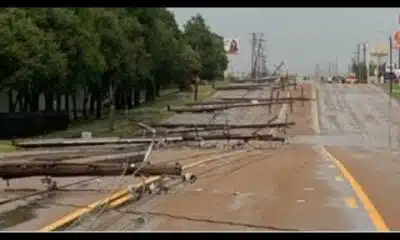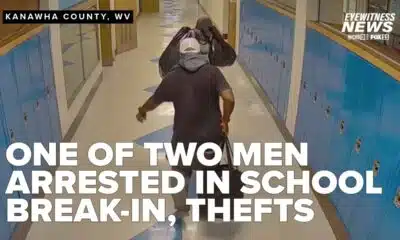News from the South - North Carolina News Feed
Daughter’s six-week search for missing parents marked by miscommunication, false sightings, DNA samples • Asheville Watchdog
Asheville Watchdog is bringing you the stories behind the staggering loss of life from Helene, the children, parents, grandparents, multiple generations of a single family, all gone in one of the worst natural disasters to hit the mountains of western North Carolina. This is the ninth installment.
The sorrow and torment are sadly familiar by now: A daughter desperately searching for her missing parents only to discover they were never coming back.
Nola and Robert Ramsuer died when floodwaters overtook their Swannanoa riverside trailer in Tropical Storm Helene.
But for daughter Shalana Jordan, getting to that agonizing answer took six weeks and included multiple searches through mud-caked debris, repeated calls to aid agencies, false sightings from well-meaning strangers, and a bureaucratic labyrinth that often appeared inept at tracking the missing and the dead.
Read previous installments of The Lives We Lost.
The Ramsuers, both 70, were among the 43 officially lost in Buncombe County to the Sept. 27 storm.
For loved ones left behind, navigating a chaotic disaster even with help pouring in from across the U.S. can be frustratingly slow and painful.
For Jordan, 40, of Winston Salem, it meant days of scouring social media posts and helicopter footage for clues about her parents, sending friends and relatives to shelters to see if they were there, providing DNA samples not once but twice, and waiting six weeks for confirmation that remains found within 10 days of the storm were those of her mother and father.
Jordan, mother of two boys, Aiden, 8, and P.J., 9, had to juggle their school needs and her own chemotherapy for a genetic disorder while searching for answers.
Holding onto hope amid the wreckage
On the morning of the storm, Jordan texted with her mother as she usually did. Around 7:30 a.m., her mother reported the power had gone out.
“She said it, like, almost funny…‘It’ll come back on again later,’” Jordan said. “She stopped texting me around eight.”
Jordan assumed her mother had gone to work at her custodian’s job at the Black Mountain Neuro-Medical Treatment Center. Her father, a Vietnam War veteran who had been in declining health, still worked a couple of days a week in maintenance for Cracker Barrel.

When Jordan couldn’t reach them that night, she figured they’d gone to bed early. The next day, images of the destruction began appearing on social media.
“I messaged all my family in Asheville, thinking maybe they called one of them and were with them, or maybe they didn’t have their phones,” Jordan said.
Over the next hours and days, she searched a Swannanoa Facebook page, scanning photos of water pickup and donation sites for any signs of her parents. She watched hours of helicopter video footage and finally spotted her parents’ trailer park on Avery Wood Drive. Many of the trailers were gone.
Benjamin Larrabee, the Ramsuers’ next-door neighbor, recorded videos of the floodwater surging through the trailer park, sweeping up semi-tractor trailers and pushing them downstream past the Ramsuers’ home.
“Man, the whole trailer just moved,” Larrabee can be heard saying on one video as the water carried two semis past the Ramsuers. “Oh man, I hope these guys are going to be all right.”
One of the trucks eventually crashed into the Ramsuers’ trailer, ripping off one end, Jordan said.
Inside, she said, the water came up to the hood above the stove; a couch had been lifted off the floor and landed on the kitchen counter.
Neither of her parents could swim. But their home was still standing.
Jordan held out hope that maybe they made it to a shelter but determining that proved no easy task.
“During all of the first three weeks, we were checking shelters,” Jordan said. “There weren’t any lists of who was in the shelters. I had to physically send people there while I was in Winston Salem.”

Jordan posted about her parents on social media and gave interviews to national media in hopes of generating leads. Her phone pinged non-stop with hopeful, but false tips.
“People message you and comment on your posts all day, every day, from six in the morning until 2 a.m. at night,” she said. “‘I think I saw them here. I think I saw them there.’”
Jordan made the two-hour trip to her parents’ home four times, traipsing through mud and debris outside and inside the trailer with relatives and her fiance, Edward Jordan. “The mud was so thick in one of the back bedrooms, I was like, what if they’re in here in the mud, and we’re walking over them?” she said.
Her own health made searching difficult. Jordan’s legs and ankles swell, and chemo leaves her weak and in pain, she said.
At one point, she injured her ankle in the remnants of the trailer. “I fell through the floor,” Jordan said, “because it was getting soft from all the mud and the moisture.”
Jordan called every government and aid agency she could think of to report her parents missing.

“Nobody would take a description of them. No one would take photos. It was crazy,” she said. “I know that it was an unprecedented situation, but FEMA, [the American] Red Cross, like they do this every day. Disaster is their only job.”
An arduous wait for confirmation
Sixteen days after the storm, Jordan said she received a call from a Buncombe sheriff’s executive asking for a description of the clothes her parents were wearing.
Three days later, “I got a call from the medical examiner in Raleigh saying that they think they found my parents,” Jordan said.
She did not know then, but death certificates completed later showed her mother’s body had been found Oct. 4, and her father’s Oct. 7, more than a week earlier.
“We were hunting and wasting resources this whole time,” Jordan said, “if we could have been allowed to identify bodies, or if someone had been in charge of missing persons, to say we recovered X, Y and Z bodies.

“How many resources did I waste that could have been used helping someone else or finding someone else because we had tons of community help, people searching on foot, cadaver dogs, people shoveling out mud for us?”
Dr. Craig Nelson at the Office of Chief Medical Examiner in Raleigh told Jordan the bodies believed to be her parents still had to be transported to Raleigh for examination and confirmation, she said.
Around the same time, the Buncombe Sheriff’s Office had been in contact with Jordan and sent a Winston Salem police officer to her home to collect DNA samples to match them against the remains.
The same day, about 20 minutes later, Nelson called to arrange to collect her DNA. Jordan told him, “They already came, and he was like, ‘What are you talking about?’”
Nelson said he would look into it and called back to say the first sample was headed to a Buncombe County lab, and results would take three to six weeks, Jordan said.
The Raleigh medical examiner’s lab could match the sample faster, in about a week, but she would need to provide a second round of DNA, “so more officers came and got samples,” Jordan said.
In early November, Nelson delivered the results.
“He said, ‘I’m so sorry,’” Jordan said. “My parents remains’ broke down too much during this process, and they couldn’t even get anything from their DNA samples.”
More samples were collected from the remains, and the medical examiner’s office conducted another round of testing. “We had to wait another week,” Jordan said.
She said Nelson “went above and beyond” and kept her updated daily.
The medical examiner’s office did not respond to a request for comment by deadline.
On Nov. 12, more than six weeks after the storm and five weeks after her parents’ bodies had been found, Jordan received official confirmation of their deaths.
By then, the family had already held a memorial service. Jordan said she did not want to wait with unpredictable winter weather approaching.
And she said she knew in her heart her parents were gone, especially after the discovery of a plastic bag inside their trailer with her mother’s purse, her father’s wallet, debit cards and mementos. She thinks they were planning an escape.
Also inside the bag: her mother’s cell phone, the same one she’d been texting and calling for days.
“She didn’t even have her phone,” Jordan said. “We were all just texting no one.”
Memorial brings unexpected costs, tributes
The Ramsuers’ funeral and cremation costs totaled more than $3,000 and included a “transport fee” to drive their remains from Raleigh to a funeral home in Swannanoa, Jordan said. “It’s $3 a mile to transport a body,” she said.
Cracker Barrel, her father’s employer, catered the memorial service and paid a portion of the costs, she said. The Red Cross paid the transport fee and other expenses.
The Federal Emergency Management Agency declined to pay, she said, because her father was entitled to funeral benefits as a veteran, about $300. With community donations, Jordan said the family expects to be fully reimbursed for the funeral costs.
Jordan said she’s heard from many of her parents’ friends, neighbors and co-workers, “the only good thing out of all this,” she said. “Not a handful, not dozens, but hundreds of people.”
Robert Ramsuer, a Buncombe native, served in the U.S. Army. “He saw a lot of crazy stuff” in Vietnam and served two tours after the war, his daughter said.
She described him as a spitfire who always had a story to tell. He loved fishing and hunting.
“People messaged me saying, ‘Your dad taught me how to fish 40 years ago; your dad taught me martial arts 30 years ago,’” Jordan said.
Nola Ramsuer was “very soft spoken and sweet,” she said. She baked cakes for friends’ and coworkers’ birthdays and hosted Christmas for their extended family.

One former coworker told Jordan how he’d talked to her mother about the many medications he was taking for lupus, an autoimmune disorder Jordan also has. Her mother went online and researched alternatives “and sent him these printouts of holistic things he could try to be able to get off all the medication,” Jordan said.
‘Life is so fragile’
Jordan recently collected her parents’ ashes from the Penland Family Funeral Home in Swannanoa. She said she purchased two memorial boxes, each a size large accommodating the remains of a 300-pound person, more than enough for her 140-pound father and 110-pound mother.
But Jordan said a funeral home representative informed her that her mother had been found in the mud.
He said, “‘We tried to remove as much material from her as we could, but there still was a lot mixed in, so all of her doesn’t fit inside of the box,’” Jordan said.
She said she received two boxes with her mother’s remains.
Funeral home representatives did not respond to messages seeking comment.
Jordan said that while her father had been ill, she expected to have another 20 or 30 years with her mother, who came from a family in which women lived well into their 90s, one making it to 104.
“I thought I had more time,” Jordan posted on Facebook. “Life is so fragile and can be gone in an instant.”
Asheville Watchdog is a nonprofit news team producing stories that matter to Asheville and Buncombe County. Sally Kestin is a Pulitzer Prize-winning investigative reporter. Email skestin@avlwatchdog.org. The Watchdog’s reporting is made possible by donations from the community. To show your support for this vital public service go to avlwatchdog.org/support-our-publication/.
Related
The post Daughter’s six-week search for missing parents marked by miscommunication, false sightings, DNA samples • Asheville Watchdog appeared first on avlwatchdog.org
News from the South - North Carolina News Feed
What is Chronic Venous Insufficiency? Will Trump be okay?
SUMMARY: President Trump has been diagnosed with chronic venous insufficiency, a common condition in people over 70 causing leg swelling due to blood pooling in veins. The White House confirmed no deep vein thrombosis, arterial disease, or heart issues were found, with normal cardiac function and no signs of systemic illness. Despite visible ankle swelling and bruised hands, attributed to frequent handshaking and aspirin use, the president remains in excellent health and experiences no discomfort. At 79, he stays active, working continuously. The White House emphasized these symptoms are minor and consistent with his busy public engagements and cardiovascular prevention measures.
Swollen legs led to President Donald Trump being diagnosed with what’s called chronic venous insufficiency. It’s a fairly common condition among older adults but requires a thorough checkup to rule out more serious causes of swelling in the legs. Here are some things to know.
Chronic venous insufficiency, or CVI, happens when veins in the legs can’t properly carry blood back to the heart. That can lead to blood pooling in the lower legs. In addition to swelling, usually around the feet and ankles, symptoms can include legs that are achy, heavy feeling or tingly, and varicose veins. Severe cases could trigger leg sores known as ulcers.
WRAL App: https://www.wral.com/download-wral-apps/5787234/
The Latest Weather: https://www.wral.com/weather/page/1010362/
News Tips:
Online – https://www.wral.com/report-it/
Email – assignmentdesk@wral.com
Subscribe to WRAL:
https://youtube.com/c/wral5
Follow WRAL:
Facebook: https://facebook.com/WRALTV
X: https://twitter.com/WRAL
IG: https://instagram.com/wral
About WRAL-TV:
WRAL is your Raleigh, North Carolina news source. Check out our videos for the latest news in Raleigh, local sports, Raleigh weather, and more at https://WRAL.com
#localnews #northcarolina
News from the South - North Carolina News Feed
US House votes to yank funding for NPR, PBS, foreign aid, sending bill to Trump’s desk
SUMMARY: On July 2, 2025, the U.S. House approved legislation to cancel $9 billion in previously authorized spending on public broadcasting and foreign aid, marking only the second time in over 30 years Congress approved a presidential rescissions request. The 216-213 mostly party-line vote sends the bill to President Donald Trump for signature. The Corporation for Public Broadcasting will lose $1.1 billion in funding for NPR, PBS, and local stations. The bill also cuts $8 billion in foreign aid but protects HIV/AIDS, tuberculosis, malaria, and maternal health programs. This follows Senate approval with some adjustments and reflects the White House’s push to focus spending on American interests.
The post US House votes to yank funding for NPR, PBS, foreign aid, sending bill to Trump’s desk appeared first on ncnewsline.com
News from the South - North Carolina News Feed
Missing voter information the objection of NC search
North Carolina State Board of Elections Executive Director Sam Hayes is setting off on a mission to correct 103,000 North Carolinians’ voting records from which some information is missing.
He maintains that the process, dubbed the Registration Repair Project, will not remove any eligible voters from the state’s voter rolls.
According to the state elections board, 103,270 North Carolina registered voters have records that lack either their driver’s license number, the last four digits of their Social Security number or an indication that they have neither.
[Subscribe for FREE to Carolina Public Press’ alerts and weekend roundup newsletters]
Last year, this missing information became the stuff of headlines, lawsuits and the high-profile election protest of Republican Court of Appeals Judge Jefferson Griffin, who lost his bid for state Supreme Court to the incumbent justice, Democrat Allison Riggs, by 734 votes.
In April, the North Carolina Supreme Court declined to remove ballots from the count based on missing identification numbers; they said the state elections board, not voters, was responsible for a faulty voter registration form that didn’t make it abundantly clear that this information was required.
While Griffin lost, the issue he raised remains salient for a newly Republican elections board and the U.S. Department of Justice, which promptly sued the state board over alleged violations of the federal Help America Vote Act’s voter registration provisions.
Thursday, Hayes told reporters that a process he unveiled in late June to gather these missing identification numbers had begun in earnest.
“We must put this issue behind us so we can focus our attention squarely on preparations for accurate and secure municipal elections this fall,” he said.
The plan to collect missing information
There are two groups of voters under Hayes’ plan.
The first group includes registered voters who have never provided a driver’s license, the last four digits of their Social Security number or an affirmation that they lack both. The state elections board has asked county election boards to check their records for these numbers, in case they were provided but not correctly entered into the voting system.
In early August, the state elections board will send letters to the remaining voters in this group requesting the missing information. If affected voters do not comply, they will vote provisionally in future elections. The elections board will create a flag on these voters’ records for poll workers.
The second group includes registered voters whose records do not show that they’ve provided an identification number, but have shown additional documentation at the polls proving their identity and eligibility under HAVA. These voters may vote a regular ballot.
However, the elections board will still send them a letter in a second mailing asking for the missing identification number to bolster the state’s voter records. Even so, if they do not oblige, they still will not be at risk of being disenfranchised, NCSBE General Counsel Paul Cox said.
County election boards have already made progress, and their work will continue as the mailings go out, Hayes said.
Voters can check to see whether they’re on the list of those with missing information by using the Registration Repair Search Tool. If voters don’t want to wait for the August mailing, they can submit an updated voter registration form using their driver’s license through the online DMV portal or visit their county elections board in person with their driver’s license or Social Security card.
“We anticipate the number of voters on the list will decrease quickly as word spreads about this important effort,” Hayes said.
The State Board of Elections unanimously approved the plan last month, despite some concerns from Democrat Jeff Carmon about putting up an extra obstacle for voters because of a problem with missing information that the voters didn’t cause.
“It’s hard to understand starvation if you’ve never felt the pangs of hunger,” Carmon said. “It’s the same situation with voting obstacles. Your perspective of an obstacle may not be the same as someone who’s consistently had their identity and their validity questioned.”
Nonetheless, Carmon and fellow Democrat board member Siobhan Millen ultimately voted in support of the plan.
Same ballot, different rules
Normally, when a voter casts a provisional ballot, the county elections board determines whether their ballot counts by the post-election canvass, held nine days after an election.
Voters may have to provide documentation or information to prove their eligibility to vote in order to be accepted.
The same process applies to the 103,000 affected voters, with a catch. Their vote may be accepted for federal contests, but not state contests, due to a difference in law.

According to the DOJ’s interpretation, the National Voter Registration Act requires all provisional votes of “duly registered voters” to count, Cox said.
But the state elections board has interpreted the state Supreme Court and North Carolina Court of Appeals’ decisions in the Griffin case as requiring a driver’s license, the last four digits of a Social Security number or an affirmation that a voter has neither before accepting their votes in state and local contests.
Under a recent election law change, county election boards have three days to validate and count or reject provisional ballots.
But sometimes, mismatches happen during validation due to database trouble with reading hyphenated names or connecting maiden and married names, for example, Cox said. The board has designed a “fail safe” in case this comes up.
When there’s a mismatch during the validation process, state law allows voters to provide additional documentation — like a driver’s license, bank statement or government document with a voter’s name and address — to prove their eligibility.
“A big chunk of these voters will have already shown HAVA ID, and that’s because in the past, when this information was not supplied, the county boards would still require these voters to show that alternative form of HAVA ID when they voted for the first time,” Cox said.
Poll workers will ask provisional voters to provide this additional documentation so that they can mark it down for later, if validation doesn’t work, he added.
Democrats threaten countersuit
Last week, the Democratic National Committee threatened the state board with litigation if they went ahead with their plan regarding those with missing information.
The letter claimed that the plan would remove eligible voters from the rolls illegally.
Hayes disagrees. In his view, he’s just following the law.
“It’s not the fault of the voters,” he said. “But at the same time, we’re required by the law to go back and collect this information, which should have been done at the time, and it certainly should have been done in the intervening time.”
He also clarified that North Carolina’s photo voter ID requirement won’t suffice for the impacted voters. They still have to vote provisionally so that their identification numbers can go through the validation process, he said.
As for whether his fully fleshed out plan will appease the DNC?
“We hope so,” Hayes said.
This article first appeared on Carolina Public Press and is republished here under a Creative Commons Attribution-NoDerivatives 4.0 International License.
The post Missing voter information the objection of NC search appeared first on carolinapublicpress.org
Note: The following A.I. based commentary is not part of the original article, reproduced above, but is offered in the hopes that it will promote greater media literacy and critical thinking, by making any potential bias more visible to the reader –Staff Editor.
Political Bias Rating: Centrist
This article presents a balanced and factual report on North Carolina’s voter registration issue, focusing on the administrative process and legal context without overt editorializing. It includes perspectives from both Republican and Democratic figures, highlights legal rulings and procedural details, and covers concerns from Democrats alongside the state elections board’s explanations. The language is neutral, aiming to inform about the complexities of voter ID requirements and the Registration Repair Project without endorsing a particular political stance or framing the issue through a partisan lens.
-
News from the South - Tennessee News Feed5 days ago
Bread sold at Walmart, Kroger stores in TN, KY recalled over undeclared tree nut
-
News from the South - Arkansas News Feed7 days ago
Man shot and killed in Benton County, near Rogers
-
News from the South - Georgia News Feed1 day ago
Aiken County family fleeing to Mexico due to Trump immigration policies
-
News from the South - Alabama News Feed6 days ago
Girls Hold Lemonade Stand for St. Jude Hospital | July 12, 2025 | News 19 at 10 p.m. – Weekend
-
News from the South - Georgia News Feed7 days ago
Anti-ICE demonstrators march to Beaufort County Sheriff's Office
-
News from the South - Oklahoma News Feed7 days ago
Police say couple had 50+ animals living in home
-
Mississippi Today4 days ago
Coast judge upholds secrecy in politically charged case. Media appeals ruling.
-
Mississippi Today1 day ago
Driver’s license office moves to downtown Jackson










































